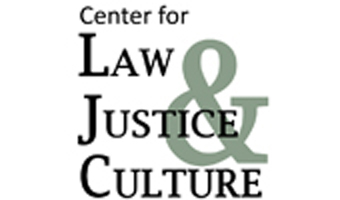The Center for Law, Justice & Culture has announced its law-related graduate course offerings for fall 2021.

The M.A. in Law, Justice & Culture—which focuses on critical analysis of law in relation to society, culture, politics and power—is currently accepting applications for summer and fall 2021.
- The deadline to begin the on-campus program in fall 2021 was March 15. We are still accepting applications on a rolling basis, as long as space is available in the incoming class.
The deadline to begin the eCampus program in summer 2021 is April 15.
The deadline to begin the eCampus program in fall 2021 is July 15.
CLJC Core Courses
LJC 6500: Research Methods in Law, Justice & Culture
Professor Haley Duschinski
Modality and Times: Online Asynchronous
This course introduces students to the possible forms of interdisciplinary law and society research and the methodological tools that can be deployed in conducting such research. It considers the sociological, anthropological, historical, and political methodologies applied to law, regulation, justice, and social order. The course focuses primarily on empirical research and qualitative methods, with special attention to issues of interpretation, context, meaning, culture, and narrative.
LJC 6965: Legal Practice Workshop
Professor Larry Hayman
Modality and Times: Online Asynchronous
This course introduces the research, writing, and analytical skills that legal professionals need in their legal practice, including the basics of legal research and legal reference for a variety of print and electronic media.
CLJC Elective Courses
HIST 5521: Medieval Law & Society: Byzantine, Sharia, and Germanic Law, 500-1000
Professor Kevin Uhalde
Times: Online Asynchronous
*This course is only available for eCampus students
Beginning with the end of the western Roman Empire in 476, this course surveys major legal systems emerging around the Mediterranean and western Europe over the next 500 years. The legacy of imperial Roman law affected all these systems, whose own legacies would endure for centuries. Featured in the survey are the reforms of Justinian and the Corpus Iuris Civilis, early Frankish law, the Visigothic Code, the formation of Islamic jurisprudence, Carolingian legal reforms, and Anglo-Saxon law before the Norman Conquest. Focal topics allow comparison between different legal systems and the societies they affected, e.g. sources of legal authority (human and divine, oral and written); status and rights of women; slavery and minority groups; vengeance and restitution. Students analyze these topics through case studies, based on primary sources in translation.
PHIL 5420: Philosophy of Law
Professor Alyssa Bernstein
Modality and Time: Hybrid; Tuesday and Thursday, 1:30-2:50pm (hybrid)
Consideration of nature and justification of law and examination of some specialized topics in philosophy of law including ascription of responsibility, civil disobedience, theories of punishment, liberty, etc.
POLS 5015: Constitutional Law
Professor Kathleen Sullivan
Modality and Times: Online Synchronous; Tuesday, 3:05-5:50pm
The United States Constitution confers authority on the various branches of government in order to empower the federal government. At the same time, the Constitution is designed to restrain public officials in their exercise of institutional power to prevent abuse of government power. In Madisonian theory, the separation of powers system works when one branch challenges another in its exercise of power. Those who challenge another may be motivated by politics or partisanship, but they couch their challenge in constitutional language. Hence ‘constitutional politics’ serves as conflict that is healthy for the American constitutional order. The system is in trouble when public officials fail to engage in conflict; if one branch asserts excessive power and another branch does not challenge it, then the system runs into the danger of tyranny, which James Madison defined as the accumulation of powers in one branch. Course examines historic and recent constitutional issues to assess whether each branch has lived up to its responsibility of checking the others. If any branch has been remiss, we will explore why. *In fall 2021, Professor Sullivan has designed the course to respond to current events, including a student-led research component. Student research topics might include law-and-society issues, such as construction of legal knowledge about sexual harassment.
POLS 5739: Politics of Race
Professor Kirstine Taylor
Modality and Times: Hybrid; Tuesday and Thursday, 12:00-1:20pm (hybrid)
Examines various, intricate relationships between race and politics in the United States. Starts with a basic introduction to the concept of race, its origins and evolution. Attention paid early on to the contradictory projects of democracy and racial hierarchy, specifically, the enterprise of white supremacy. Looks at past and present racial topographies, including, but not limited to, trends in partisanship, political ideology and voter turnout per racial group. Examines how the three branches of government have supported America’s war on drugs, and subsequently how this war has differentially impacted the American people on lines of race, gender, and class. Investigates how racial identity is shaped by varying economic, social and political contexts, and further how these identities can be mobilized for collective purposes. We think critically about what is at stake in adhering to or diverging from particular racial identities in the political and social arena, how racial identities are policed by group members, and lastly, what is at stake in defining racial authenticity. Last set of readings treat the ways racial anxieties are manipulated during electoral campaigns as a strategy for specific political gains.
POLS 5753: American Whiteness
Professor Vincent Jungkunz
Modality and Times: In Person; Wednesday 3:05-5:50pm
Engages Critical Race Theory and Critical White Studies in order to better understand how ‘whiteness’ perpetuates itself and racism as well. Critically examines the concept of whiteness, and what it has meant to the (white) public over time. To what extent is being white a biological, ideological, psychological, or political phenomenon? Introduces theories of whiteness as a legal construction, as a privileged status, and as a dynamic social identity. Aids understanding the political meaning of whiteness by examining the relationship of whiteness to American citizenship, immigrants’ motivations to assimilate into whiteness, and by learning how politicians and governmental bodies have protected the interests of white Americans by inscribing white privilege into public policies. Investigates white American public opinion on political issues, their attitudes about people of color, as well as what they think about their own racial group and racial identity. Discusses the normative quality of white racial identity, and how colorblind ideology makes it difficult to see and understand whiteness as power and privilege. Examines the contexts in which whiteness is made visible, and how awareness of white racial identity can be cultivated.
POLS 6120: Seminar in American Politics II: Executive & Legislative Institutions
Professor Linda Trautmann
Times: Online Asynchronous
*This course is only available for eCampus students
Introduces some of the latest theoretical innovations in theories of American political institutions (executive & legislative). It explores how the make-up of executive and legislative institutions influences their behavior at the federal and state levels. Institutional actions that will be covered in the class include war-making, budgetary decision-making, and policy-making in the social and economic arenas. The impact of external actors–political parties, interest groups, the media–will also be investigated.
SOC 5640: Law in Societies
Professor Bruce Hoffman
Times: Online Asynchronous
Explores the fundamental roles that law plays in organizing contemporary social life. Considers various ways of understanding law’s complex presence: how law shapes and enables routine social interaction, how law constructs differences among people and their actions, how law mediates and enforces power relationships, and how law matters for the kind of societies we have. Our inquiries will examine official legal institutions and actors, but the class will emphasize how law works as a complex array of norms, symbols, discourses, and practices that infuse and shape all aspects of social life, from everyday social interaction to social movements and official legal institutions and actors. The course draws from the U.S. experience as well as historical, international, and transnational perspectives.
SOC 5670: Violence Against Women
Professor Holly Ningard
Modality and Times: Hybrid; Monday and Wednesday 12:55-1:50pm (hybrid)
Examines related forms of violence where women are the predominant victims, with a major emphasis on forcible rape and woman physical abuse. Other forms of violence against women may be included, such as stalking, rape in marriage, incest and other related subjects. The place of masculinities, the development of a rape culture, and the role of the media, including pornography, will be examined. The course will include both theoretical and empirical findings and developments.
Please contact CLJC MA Director Haley Duschinski for more information about the program.


















Comments